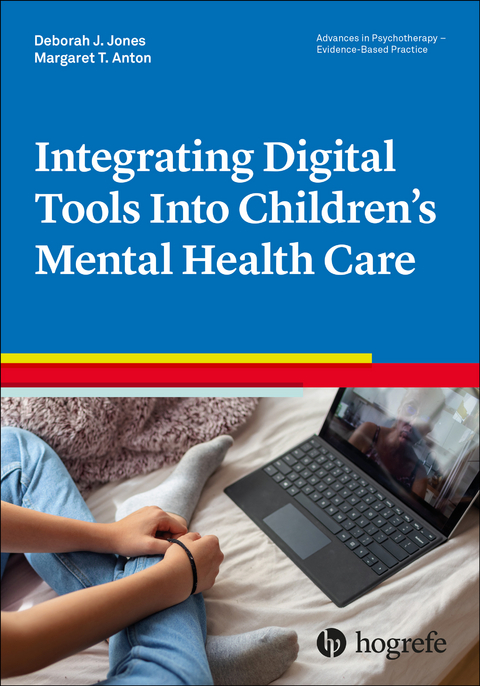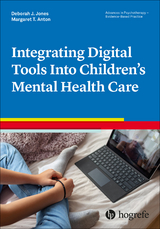Integrating Digital Tools Into Children's Mental Health Care
Hogrefe Publishing (Verlag)
978-0-88937-601-4 (ISBN)
* Expert authors examine the evidence-base
* Provides hands-on exercises for selecting digital tools
* Includes downloadable handouts and forms
Practitioners need to know the evidence behind using digital mental health approaches and tools, including telemental health visits. This accessible book provides that help as the authors guide the reader through the rationale, options, and strategies for incorporating digital tools into children's mental health care, drawing on their extensive knowledge of both current research and clinical practice. They outline the leading theoretical approaches and highlight mechanisms involved in how digital tools increase access to, engagement in, and outcomes of evidencebased mental health services for children and families. Through clinical vignettes and hands-on exercises included in this Advances in Psychotherapy series volume, mental health providers will gain insight into how to select a digital tool and identify its various uses. The reader is also given the opportunity to explore their own attitudes and comfort with incorporating digital tools into practice with their young clients and their families. Numerous
downloadable handouts and forms for clinical use are provided in the appendix.
Deborah J. Jones, PhD, is the Zachary Smith Distinguished Term Professor and Associate Chair of Psychology and Neuroscience at the University of North Carolina at Chapel Hill. She has had multiple grants from the National Institute of Mental Health to study the role of digital tools in children's mental health and has over 100 publications on related topics. She also teaches a digital mental health course at the university. Margaret T. Anton, PhD, is a senior clinical innovation and research manager at Two Chairs, a behavioral health company using technology and design to improve the process of accessing and receiving quality mental health care. Over the past ten years, she has developed, evaluated, and implemented technology-enabled behavioral interventions in academic, community, and industry settings.
Dedication
Acknowledgments
Preface
1 Description
1.1 Terminology
1.2 Definition
1.3 Telemental Health
1.3.1 Nonpublic Facing Video Communication
1.3.2 HIPAA Compliance
1.3.3 HITECH Act
1.3.4 Reimbursement
1.4 Mobile (Mental) Health
1.5 Mental Health Apps
1.6 Digital Therapeutics
1.7 Stand-Alone Treatments
1.8 Digital Games
1.9 Augmented and Virtual Reality
1.10 Just-in-Time (Adaptive) Intervention
1.11 Artificial Intelligence and Machine
Learning
1.12 Psychological Interjurisdictional
Compact
2 Theories and Models
2.1 Evidence-Based Practice
2.1.1 Cognitive and Behavioral Theories
2.2 Health Behavior Models
2.3 Technology Acceptance Model
2.4 Implementation Models
2.5 User-Centered Design
2.6 Models of Incorporating Digital Mental
Health Tools Into Practice
3 Assessment and Treatment Indications
3.1 Case Conceptualization
3.2 Participants (Parent or Child)
3.3 Sociodemographic Factors
3.3.1 Socioeconomic Status
3.3.2 Age
3.3.3 Parent Gender and Family Structure
3.3.4 Race/Ethnicity
3.3.5 Sexual and Gender Minority Youth
3.3.6 Geographic Region
3.4 Technological Literacy
3.5 Attitudes
3.6 Disorder
4 Treatment
4.1 Methods of Treatment
4.1.1 Evidence Base for Digital Tools in
Clinical Practice With Children
4.1.2 Integration of Digital Tools in Clinical
Practice With Children
4.1.3 Security and Privacy With Digital Tools
in Clinical Practice With Children
4.1.4 Ethical Issues With Digital Tools in
Clinical Practice With Children
4.1.5 Cultural Considerations With Digital
Tools in Clinical Practice With Children
4.2 Mechanisms of Action
4.3 Efficacy and Prognosis
4.3.1 Does Technology Increase Access to
Children's Mental Health Services?
4.3.2 Does Technology Increase Engagement
in Children's Mental Health
Services?
4.3.3 Does Technology Improve Outcomes
of Children's Mental Health Services?
4.3.4 Summary
4.3.5 Implementation Outcomes
4.4 Variations of the Method and
Combinations With Other Approaches
4.5 Problems in Carrying Out the Treatments
4.6 Multicultural Issues
5 Case Vignettes
6 Further Reading
7 References
8 Appendix: Tools and Resources
| Erscheinungsdatum | 01.12.2023 |
|---|---|
| Reihe/Serie | Advances in Psychotherapy - Evidence-Based Practice ; 52 |
| Verlagsort | Toronto |
| Sprache | englisch |
| Maße | 178 x 254 mm |
| Themenwelt | Geisteswissenschaften ► Psychologie ► Entwicklungspsychologie |
| Geisteswissenschaften ► Psychologie ► Klinische Psychologie | |
| Medizin / Pharmazie ► Medizinische Fachgebiete ► Psychiatrie / Psychotherapie | |
| Schlagworte | Child and Adolescent Mental Health • Child Development • digital mental health tools • Digital Tools • telemental health visits |
| ISBN-10 | 0-88937-601-8 / 0889376018 |
| ISBN-13 | 978-0-88937-601-4 / 9780889376014 |
| Zustand | Neuware |
| Haben Sie eine Frage zum Produkt? |
aus dem Bereich




